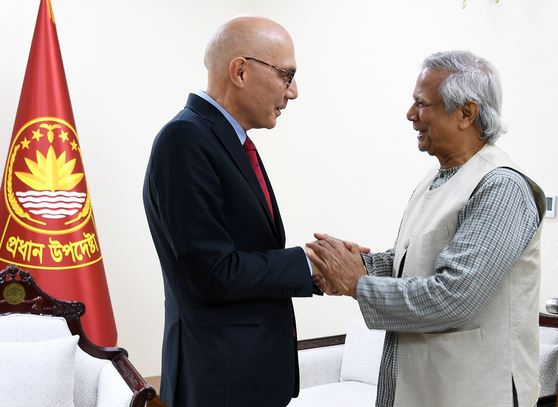

United Nations High Commissioner for Human Rights Volker Türk today said the independent UN Fact Finding Mission, which is investigating atrocities committed during the July-August mass uprising in Bangladesh, would hopefully finalise its report by the first week of December.
He made the remark when he called on Chief Adviser Professor Muhammad Yunus at his office at Tejgaon in the city.
Chief Adviser's Press Secretary Shafiqul Alam briefed reports about the meeting at Foreign Service Academy here this evening.
The UN rights chief briefed the Chief Adviser about the work of the UN fact-finding mission and his meetings in Dhaka with advisers, the chief of army staff, heads of reform commissions, students, and officials.
The UN rights chief also discussed the work of the International Crimes Tribunal of Bangladesh that is now investigating heinous crimes and crimes against humanity committed during the revolution and the functions of reform commissions set up by the interim government to conduct meaningful reforms of the country's institutions.
"There are so many things that need to be fixed," he said, adding that he has also spoken to the members of the Inquiry Commission investigating hundreds of cases of enforced disappearance that occurred during the dictatorship.
Türk said his office is extending support to the Inquiry Commission.
He also urged the Chief Adviser to strengthen the National Human Rights Commission by making it "independent" and "fully functional".
He said the UN rights agency would like to strengthen its presence in Dhaka.
Chief Adviser Prof Yunus thanked the UN rights chief for visiting the country and for his support during the revolution.

"The people of Bangladesh are happy for your visit. They are grateful to you," he added.
Prof Yunus said his government is committed to upholding the human rights of every citizen and also to making sure that development and human rights go hand in hand.
He said his government would not "repeat" the mistakes and the crimes committed by the previous government.
The UN rights chief and the Chief Adviser also discussed the Rohingya crisis, especially the influx of tens of thousands of new Rohingyas taking refuge in Bangladesh after fleeing violence in Myanmar.
Türk called for more international support for the Rohingya refugees and sustained efforts to resolve the crisis.
The Chief Adviser sought UN support to create a safe zone in Myanmar's Rakhine state so that the internally displaced people in the region can stay close to their homes.
Both the dignitaries called for vigorous ASEAN role in an effort to "put some dynamism" into this regional issue for its earliest sustainable solution.
